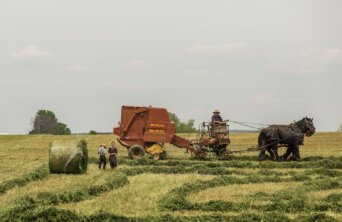- About
- Topics
- Picks
- Audio
- Story
- In-Depth
- Opinion
- News
- Donate
- Signup for our newsletterOur Editors' Best Picks.Send
Read, Debate: Engage.
| topic: | Sustainable Agriculture |
|---|---|
| located: | Brazil |
| editor: | Ellen Nemitz |
"When a woman moves forward, no man moves back," said Mazé Morais, the secretary of rural women workers at National Confederation of Rural Workers and Family Farmers during the final session of the Daisies' March (Marcha das Margaridas), a historical movement of rural women advocating for public policies supporting small-scale agriculture.
The march was named after Margarida Maria Alves, a union leader who was killed by landowners in 1983 while advocating for workers' rights, including work hour regulations and paid vacations, in the northeastern state of Paraíba. Its inaugural edition took place in 2000, and served as a platform to expose the issues of hunger, poverty and gender-based violence that disproportionately affect female rural workers. This year, the march marks its seventh consecutive edition.
On 15 and 16 August, over 100,000 women gathered in Brasilia, Brazil's capital city. Their collective purpose was to shine a light on a multifaceted agenda that includes the fight against racism and violence directed at women, the advocacy for human rights and environmental preservation and the support for the growth of family farming.
The 2023 edition of the Daisies' March was structured around several key principles: participatory democracy and the empowerment of the people; the amplification of women's political influence and engagement; the assurance of access to essential resources like food, water and energy; the promotion of agroecology and the assurance of food security; the establishment of non-sexist and anti-racist public education, alongside the right to education within rural regions; and safeguarding the fundamental right to live a life free from any manifestation of violence.
"The rampant depletion of nature and biodiversity, combined with the strengthening of transnational mining and agribusiness companies and the sacrifice of national and popular sovereignty, with the subordination of the country to the interests of transnational corporations, have reinforced the need to think about what kind of Brazil we want to rebuild," reads the march's official statement. "A Brazil of good living! This is the horizon and the meaning of the reconstruction of Brazil that the Daisies want."
The Daisies March finds support in the current national government. Prior to the event, leaders of the march have already delivered a letter of demands to ministries during an official ceremony in June. The Minister of Women, Cida Gonçalves, had then praised the opportunity to discuss these demands and march for a new future. "We need to guarantee democracy," she said, "but it is also a moment to discuss the issue of women's political participation."
The Ministry of Agriculture and Family Farming attended the meetings as well and announced a series of measures in response to the demands, including the resumption of land reform, which is now focused on women. It also declared the launching of programmes to promote food and nutrition security, the economic autonomy of rural women, agro-ecological technical assistance and the creation of the National Commission to Combat Violence in the Rural Areas.
Family farming has also gained prominence during the Amazon Dialogues, an event held in Belém, Brazil, between the 4 and 6 August, 2023. The final document released by the Amazon Cooperation Treaty Organization (which includes Brazil, Ecuador, Venezuela, Bolivia, Guyana, Peru, Suriname and Colombia) underscores their dedication to endorsing family farming and agroforest systems. These endeavours are recognised as vital for achieving sustainable development, ensuring food and nutrition security and preserving sovereignty.
Image by Vladimir Kudinov.
